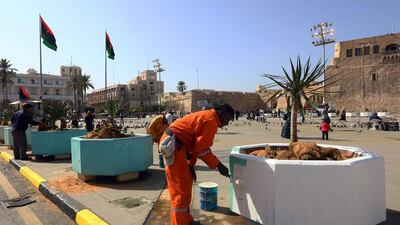TRIPOLI // Six years after the start of an uprising that toppled a dictator, Libyans in Tripoli see no reason to celebrate.
Power cuts, exorbitant prices and insecurity plague their daily lives.
At a moment’s notice, shopkeepers in the Libyan capital pull down their shutters, cars make sudden u-turns and gunshots ring out in the empty street.
“We’re living at the mercy of men obsessed with weapons, violence and profit,” says Abdelalim Al Hajj Ali, as he hides with his daughter from clashes inside a bakery.
“The situation in our country is dramatic,” the 48-year-old teacher says, while fighting rages outside in one of the capital’s shopping streets.
Libyans will mark the anniversary of the revolt that ended Muammar Qaddafi’s decades-long rule on Friday. They say living conditions have deteriorated in the year since a UN-backed unity government started working in the capital. The Government of National Accord has also failed to assert its authority across the rest of the oil-rich country.
“It’s tiresome to see Libyans living in the dark, poverty and constant fear when there’s a sea of oil in their country’s belly,” Ali says.
Holed up inside the bakery, Ali and his daughter can hear gunfire and the screeching tires of the fighters’ pick-ups armed with anti-aircraft guns.
Tripoli has been controlled by dozens of armed groups since Qaddafi’s fall, and it is often hard for residents to follow their fluctuating loyalties and who they are fighting.
Armed groups display stickers on their vehicles according to their current interests, usually mentioning an official body – such as “army” or “interior ministry” – to give themselves some legitimacy.
Clashes have been regular in the Libyan capital since 2011, and checkpoints have spread across the city.
While traffic jams create a sense of normality for Libyans living in the capital, driving across Tripoli can be dangerous, especially at night.
To help each other out, Libyans have started swapping information about safe routes on social media.
“The Ghot Ashaal road isn’t safe. An armed criminal gang is stealing cars,” one user writes on a Facebook group dubbed Safe Path with more than 20,000 followers.
“Exchange of gunfire on the Al Madar road,” warns another user. “Brief truce but expect a second half-time.”
As if security was not enough to worry about, Libyans in the capital have also been hit by daily power and water outages, dizzying price hikes and a cash crunch.
In the long queues outside banks, people are on edge and arguments break out for the smallest of pretexts.
Mariam Abdallah, 50, says she had hoped life in the capital would improve after the GNA started work in March last year.
“We thought things couldn’t get worse but they have,” says the travel agency employee.
She lists longer power cuts, water and gas shortages, fuel queues, hyperinflation and an ongoing cash crisis “which have literally handicapped the city”.
“People are exhausted and depressed. The anniversary of the revolution is nearing and people have no cause to celebrate.”
Tarek Megirissi, an Libyan political analyst, is similarly downbeat.
“Despite Libya’s oil output recovering, the economic situation remains dire with basic goods growing more scarce and expensive, alongside a worsening liquidity crisis,” he says.
“Services are collapsing, and no political body seems capable of governing the country and instead are pre-occupied with jostling for absolute power.”
A former administration tried and failed to seize three ministries in the capital in January, while a parliament in the country’s far east has refused to cede power to the unity government.
But UN envoy Martin Kobler has said talks had made progress on “possible amendments” to the deal that created the GNA, notably on the future role of a rival army chief backing the parliament in the east. Field Marshal Khalifa Haftar, whose forces control much of eastern Libya, was not included in the GNA’s original line-up.
In a queue for the bank in Tripoli, However, Selma Fathi, a 53-year-old housewife, says she is optimistic.
“I have great hope of seeing Libya rise up again thanks to its youth,” she says.
* Agence France-Presse

